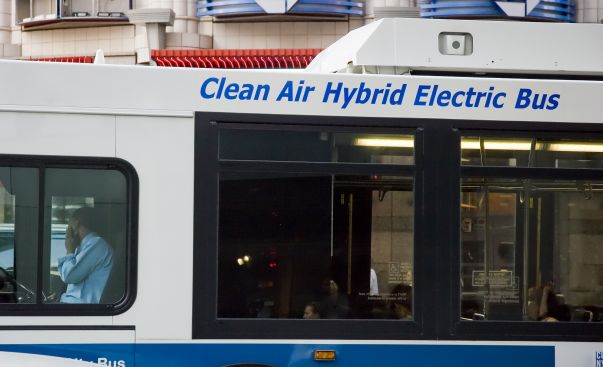By Sarah Nightingale, Senior Public Information Officer, UC Riverside — Matthew Barth, a professor of engineering in UC Riverside’s Bourns College of Engineering and director of the university’s Center for Environmental Research and Technology (CE-CERT), and his team have been awarded $2.8 million from the U.S. Department of Energy’s Advanced Research Projects Agency-Energy (ARPA-E) to improve the efficiency of plug-in hybrid electric buses. The award is supported with additional co-funding of $460,000 from project partners, bringing the total to more than $3.2 million.
The competitive award is part of ARPA-E’s NEXT-Generation Energy Technologies for Connected and Automated On-Road Vehicles (NEXTCAR) program, which supports the creation of new control technologies that reduce the energy consumption of future vehicles by using connectivity and vehicle automation.
Buses play an important role in today’s transportation system, providing mobility to millions of Americans each day. While hybrid electric buses have been introduced across the U.S., there has been little effort to improve the poor energy efficiency of buses that arises from frequent stops and idling.
Barth’s team will design, develop, and test a new powertrain eco-operation system for natural gas-fueled plug-in hybrid electric buses. This system will use emerging connected vehicle applications like predictive approach and departure, efficient adaptive cruise, and optimized stopping and accelerating from stop signs and bus stops to improve energy efficiency. Using information from traffic signals and surrounding vehicles, the team will improve the powertrain operation by intelligently managing combustion engine output, electric motor output, and battery state of charge in this hybrid application. Barth’s team includes researchers from UCR and partners from Oak Ridge National Laboratory, US Hybrid, and the Riverside Transit Agency.
“Significant research and development is already underway to make future vehicles more connected and automated in order to reduce road accidents and traffic fatalities. In this research, we will leverage these technologies to improve energy efficiency, which is particularly important in the case of transit buses,” Barth said.
Barth, who has led CE-CERT since 2007, has pioneered specific intelligent transportation systems (ITS) applications and techniques that are aimed at reducing environmental damage and reducing fuel consumption. Last month, he received a 2016 Outstanding Research Award from the Institute of Electrical and Electronic Engineers (IEEE) Intelligent Transportation System Society.
Originally published in UCR Today on November 4, 2016. Republished with permission.

